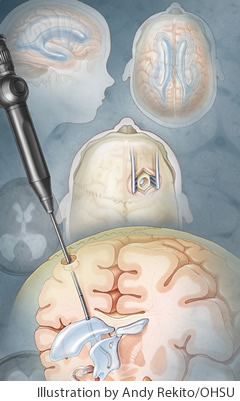Pediatric Neuroendoscopy
OHSU Doernbecher’s pediatric neurosurgeons offer your child or teen world-class skill in neuroendoscopy, a minimally invasive surgical technique for surgery in the brain and spine.
How it works

Our neurosurgeons use an endoscope, a tiny telescope with attached surgical instruments and a high-resolution video camera.
Paired with computer-aided navigation, the system enables our neurosurgeons to precisely target the surgical area while avoiding healthy tissue.
Our pediatric neurosurgeons also offer expertise in flexible neuroendoscopy, making additional procedures possible with just one small incision.
Why it matters
- Much less invasive: Our pediatric neurosurgeons can reach the brain through an incision smaller than a dime, for example, instead of lifting part of the skull. Patients have minimal pain and quicker recoveries.
- Precision: Surgeons can pinpoint areas in even very young patients. They can better “see” in the brain or spine, helping in tumor removal. They can also more easily preserve healthy tissue.
- Better outcomes: Our neurosurgeons can reach areas that were previously inaccessible. Neuroendoscopy, along with our intraoperative MRI scanner, also aids in to-the-millimeter precision. It can play a role in treating:
- Innovation: Doernbecher is among the few children’s hospitals to offer ETV/CPC, a procedure that uses flexible neuroendoscopy to dramatically improve outcomes for infants with hydrocephalus. Most patients are spared from a lifetime of shunt dependence.
Other less-invasive techniques
Neuroendoscopy is just one less-invasive technique offered at Doernbecher Children’s Hospital. Our pediatric neurosurgeons — as part of OHSU, Oregon’s only academic health center — have done extensive research to improve patient care. As a result, they also offer expertise in less-invasive surgeries for treating Chiari malformation, tethered cord and other conditions.
Teaching others
As experts, Doernbecher neurosurgeons teach neuroendoscopy and related techniques to other surgeons, regionally and nationally.
Refer a patient
- Refer your patient to OHSU Doernbecher.
- Call 503-346-0644 to seek provider-to-provider advice.